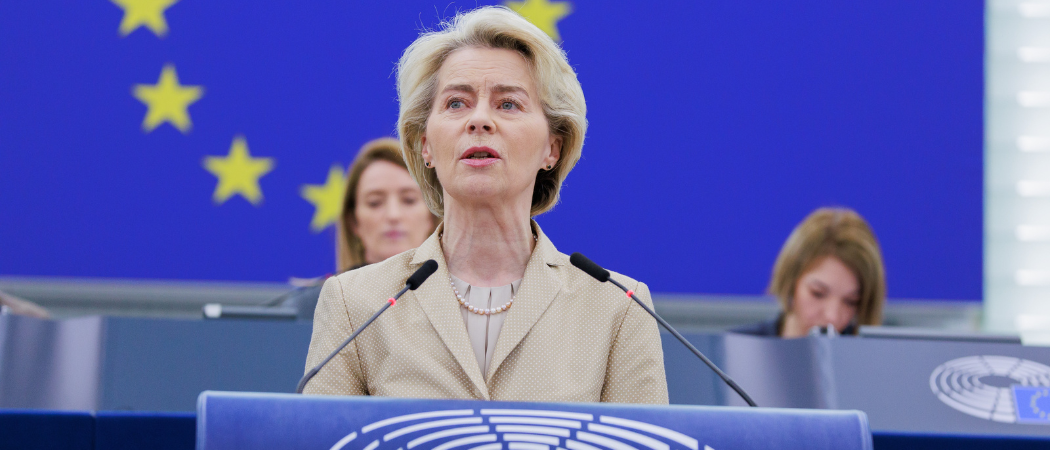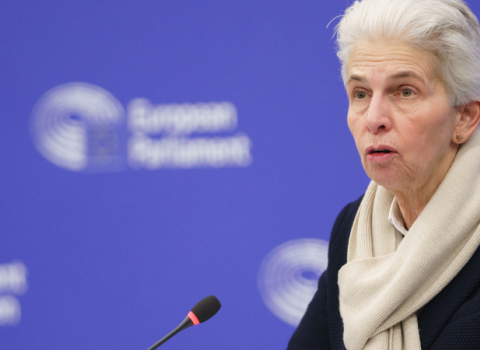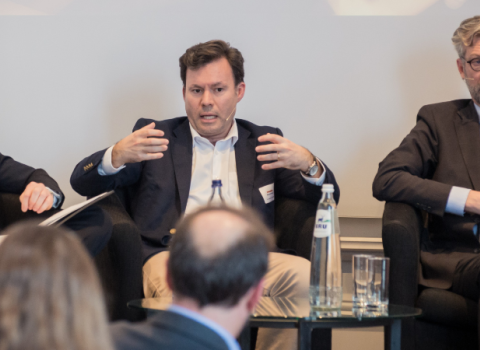The Commission president set out her vision for a new EU military-industrial-academic complex in a speech to MEPs on Wednesday

European Commission President Ursula von der Leyen addressed MEPs in Strasbourg about the need for Europe to step up its defence capabilities. Photo: Christophe Licoppe / European Union
“There is no room for any more illusions,” European Commission president Ursula von der Leyen said as she called for the bloc to get serious about its defence on Wednesday.
Ongoing geopolitical tensions require “a new European defence mindset from institutions to industries to investors,” she told MEPs in Strasbourg ahead of a debate on strengthening European defence.
She was referencing not only to Russia’s invasion of Ukraine, but also the war in Gaza and the “continued rise of aggressive economic competition and distortion.”
Von der Leyen said she is in favour of having a defence commissioner in the next administration to provide industry with the support it needs, signalling that defence will be the central focus of the next mandate following elections in June if her bid for a second term is successful.
“We need to move fast,” von der Leyen said. “The risks of war should not be overblown, but they should be prepared for. And that starts with the urgent need to rebuild, replenish and modernise member states' armed forces.”
As part of this new strategy, the EU will focus on innovation to ensure it has technological superiority in future conflicts.
“Europe should strive to develop and manufacture the next generation of battle-winning operational capabilities,” she said. “That means turbo charging our defence industrial capacity in the next five years.”
Last week, von der Leyen announced the EU will set up an office for defence innovation in Kyiv, to allow member states to learn from technologies being used in the defence of Ukraine.
The Commission also launched a consultation on opening Horizon Europe to dual use technologies with civil and military applications.
Officials have been working on that question for some time. In February 2022, nine days before Russia’s invasion of Ukraine, the Commission published a roadmap on security and defence technologies, which included a plan to allow more synergies between civilian and defence research.
Next week, it is due to present the first ever European defence industrial strategy, including plans to support joint defence procurement.
Von der Leyen said the EU would also look to facilitate offtake agreements or advance purchase agreements to provide companies with predictability, and would identify European defence projects of common interest to focus resources where they will have the biggest impact.
More and better
Access to financing is one of the primary challenges facing companies in the sector. European Investment Bank (EIB) president Nadia Calviño said the bank is “ready to do more and better” to contribute to joint projects which boost the European defence industry, after a meeting with EU finance ministers on Friday.
Von der Leyen urged member states to endorse the EIB’s proposal. “I would like to encourage our public and private lenders to support our defence industry and in particular small and medium enterprises,” she said, adding that SMEs are “the driver of innovation”.
During the debate, Manfred Weber, leader of von der Leyen’s EPP group in the European Parliament, welcomed EIB’s strategy and the idea for a dedicated commissioner to coordinate defence policy in Europe.
He also called for a change to taxonomy rules, which are an “obstacle” to financing in the sector, as it is currently unclear whether defence falls under the definition of sustainable finance.
Nicola Procaccini, co-chair of the right-wing ECR group in Parliament, agreed defence should be a priority, but said the debate should have happened sooner. “For five years, we have been talking in this house about butterflies and electric scooters instead of European security and defence,” he said.
Member states are joining the calls to step up investments. “In the current geopolitical context, security and defence must be the top priority of Europeans,” Mathieu Michel, Belgian state secretary for igitisation, told MEPs ahead of the debate.
After meeting European leaders to discuss the situation in Ukraine on Monday, French president Emmanuel Macron said there is a consensus on the need to “move stronger towards a war economy”.
On Wednesday, Ioannis Vrailas, permanent representative of Greece to the EU, warned that Europe must develop its own defence capabilities and not rely on the US.
“Twenty-seven national markets cannot do the trick any longer. We must focus on pooling research, innovation and resources,” he said at an event in Brussels organised by SEKPY, the Greek national defence industry association.
The tide is even turning in Germany, where there has traditionally been a very strong divide between civil and defence research and many universities have so-called civil clauses which prevent them from working on military-related research.
Germany’s annual assessment of its research, innovation and technology system, presented to chancellor Olaf Scholz yesterday, called for this division to be “fundamentally reconsidered”, echoing comments made by the country’s science minister earlier this month.
Long-term objectives
While much of the recent talk has been about the immediate need to supply Ukraine with weapons and ammunition, the industry association ASD is urging the EU not to neglect innovation.
It calls for a “substantial budget increase for a more strategic European Defence Fund (EDF)” in its policy manifesto for the next EU mandate from 2024 to 2029, published on Tuesday. The €8 billion EDF instrument finances research and innovation in the sector.
“Decisions on short-term needs must not undermine long-term objectives,” ASD said. “Robust investment in defence research is necessary to enhance Europe’s technological sovereignty in critical areas and ensure operational superiority against potential adversaries.”
ASD also wants the EU to do more to help defence companies access private and public investment and finance, through “political and regulatory measures that ensure that sustainability considerations and criteria do not discriminate against defence companies”.
Ahead of the informal meeting of EU finance ministers last week, the Czech government circulated a paper calling on the Commission to clarify the treatment of the defence sector in environmental, social and governance (ESG) reporting. ESG criteria play an increasingly important role in investment decisions, but the defence industry is often excluded.
University reaction
Academics are unanimous in insisting any new priorities should come with additional funding, and not take away from other research.
It will continue to be up to individual universities to decide if they want to participate in defence research, said Kurt Deketelaere, secretary general of the League of European Research Universities.
“As long as increased defence research is funded with new money and is not taking money away from civil research through Horizon Europe, now and in the future, then there is as such no problem,” he told Science|Business.
Mattias Björnmalm, Secretary General of CESAER, an association of European universities of science and technology, agrees strengthening defence must not come at the expense of other research. It is important for the academic world to “help guide these developments,” he said, noting the focus on defence capabilities also brings opportunities for universities as cutting-edge science and technology is essential to these efforts.
In a paper in 2022, CESAER argued in favour of maintaining Horizon Europe’s civilian focus. With the rise of technologies such as artificial intelligence and quantum which have clear dual use potential, the association recognises the need to engage in discussions.
“We are currently exploring how can and should the European level best support efforts around dual-use science and technology,” Björnmalm said.
A key message will continue to be the importance of engaging the full knowledge value chain. In her speech, von der Leyen spoke about innovation, but made no mention of research.
As the EU looks to develop its defence and industrial capabilities, “there is a risk that it is interpreted that the contribution from research and innovation should be almost solely focused on innovation, which would be a mistake,” said Björnmalm.
Social sciences, arts and humanities research is also key to societal resilience and defence, said Ole Petter Ottersen, acting secretary general of the Guild of Research Intensive Universities.
“It is crucial that social sciences and humanities knowledge production continues to receive financial support in order to contribute to the understanding of human aspects of conflict, decision-making, diplomacy, and the broader societal implications of defence policies,” he said. “Without cohesion and trust, any technology will fail, however sophisticated it is.”





 A unique international forum for public research organisations and companies to connect their external engagement with strategic interests around their R&D system.
A unique international forum for public research organisations and companies to connect their external engagement with strategic interests around their R&D system.